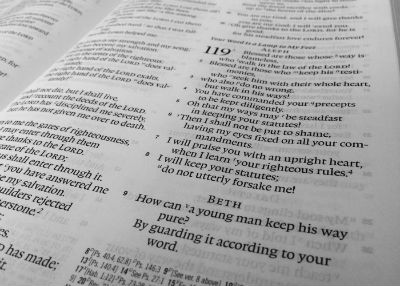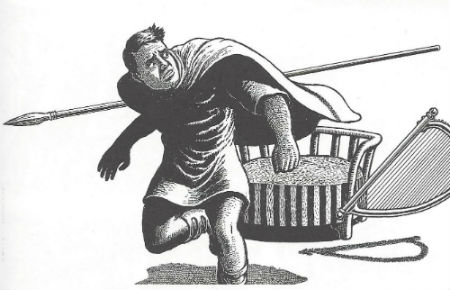Take the Psalm 119 Challenge: 176 verses or Bust!
By Neil Earle

In a world that overuses the word, “unique,” Psalm 119 surely fits the bill. The Book of Psalms is the longest book in the Bible and Psalm 119 is the longest psalm. None other comes close.
The great preacher Spurgeon called it “a star in the firmament of the first magnitude” and Augustine praised it as an “all-containing medicine to the varied spiritual diseases of men.”
Disciplined Craftsmanship
Seeing the obvious patterning in this masterpiece, C.S. Lewis argued to those thrown off by standardized worship that Psalm 119 is like an exquisite piece of embroidery, a composition woven stitch by stitch through long patient hours, artistically crafted through intense love of the subject. Like the Lindisfarne Gospels of the Middle Ages, now a masterpiece of Western culture.
The Jewish people sing it at the New Year, and many Greek Orthodox priests follow its reference (v. 62) to rise at midnight to read. The anti-slavery crusader William Wilberforce would recite it for strength on his way to and from tumultuous debates in the House of Commons.
John Calvin gave 22 sermons on each of the Psalm’s 22 sections, corresponding as they do to the Hebrew alphabet in 22x8 verse segments, revealing purposeful design.
So with the help of the English Standard Version let’s get started.
 ‘PRINCES PERSECUTE ME:’ David flees Saul's anger.
‘PRINCES PERSECUTE ME:’ David flees Saul's anger.Begin with Blessing
Psalm 119:1-8 Note the first word “Blessed,” a grand Biblical word. The Book of Psalms begins the third section of the Old Testament – Law, Prophets and Writings. Psalm 1 begins with Beatitude and so does this intricate masterpiece. “Blessed” recalls also the three divine Blessings at creation in Genesis 1 and the seven Beatitudes few people notice in the Revelation.
For starters, the author’s praise of those “who do no wrong” (v. 3) does not mean “perfect” in the moral sense but someone who steadily practices no ongoing horrendous sins – murder, blasphemy etc. The writer is not a prig. He expresses throughout a consistent longing to be better as in verse 5, “Oh that my ways were directed to keep thy statues.” The devout believer sees himself in comparison to God and knows he dare not pose as righteous. Another consistent theme of not being ashamed is set in verse 6. This is very Middle Eastern where “shame cultures” still thrive. It recalls King David’s humble plea in Psalm 25. “Let me not be ashamed.” Such earnest appeals make many think David is the primary writer of Psalm 119 as opposed to secluded, stationary priests in the Temple.
Verses 9-16 “Teach Me” Humility is expressed again. “Let me not wander” he pleads as he asks for guidance and protection against the snares and temptations of youth. The Hebrew “dabar” or “word” begins and ends this section – an example of the creative use of “the envelope style” we see across Scripture. There is subtlety here that leads us into deeper appreciation.
Verses 17-24 “Blessed the Beggars” A wave of earnest requests: “Deal bountifully,” “Open my eyes,” “Don’t hide your commandments from me.” The reference to princes plotting against him is almost a giveaway that it’s King David’s deadly enemies in view. “Take away my scorn and contempt” he begs. David had his share of this in his life. But public ridicule was met by private repentance and quiet confession of need.
Verse 25-32 Rock Bottom “My soul clings to the dust” sets up that desperate, all-or-nothing trust in God that is a consistent theme in the Psalms. His eyes melt away for sorrow; he clings to God’s testimonies as a life preserver. Again the request is heard: “Let me not be put to shame. Graciously teach me your law.” Yes, Grace was extended in the OT – not everyone knows that.
Verses 33-40 Cluster of Petitions Again the tone of earnest supplication comes through. This stanza ends with the grand word “life” which in the Bible means more than mere chemical existence. It is a fullness and abundance from living in the presence of the Almighty God (Psalm 16:11). This gift is granted by the righteousness and right dealing of God with his servant. Here the Psalmist is anticipating St. Paul’s mighty theme in Romans 5, saved by the righteousness of faith!
Verse 41-48 His Loving-kindness The word often translated “steadfast love” in modern translations is the beautiful phrase “loving-kindness” from Tyndale’s pen. “Hesed” in the OT – is mentioned 26 times in Psalm 136 alone! Even in English “loving-kindness” sets up so many tender dimensions of the gracious God’s character. It evokes here his merciful love towards his servants. The lifting of hands in verse 48 shows this whole Psalm is one heart-felt prayer, as is the book itself.
 JUDAEAN WILDERNESS: Where David hid and cried out for help.
JUDAEAN WILDERNESS: Where David hid and cried out for help.Verses 49-55 Comfort in Affliction This section corresponds to the Hebrew letter “Z” or “Zayin” and it looks like a nail, as ugly as it sounds. We meet the word “affliction” for the first time – a jarring note and one that will keep coming. “The insolent” are singled out in verse 51 in true Davidic “complaint” fashion. But remembering God’s Law in the night gives him comfort. All devout strugglers with sin and human foes will recognize this.
Verses 57-64 Songs at Midnight “I entreat your favor” (v. 58) reflects the most common posture adopted by the Psalmist across this poem – supplicating God’s help. He arises at midnight to praise the Lord. His late vigil worked for he now grasps more deeply that the earth itself demonstrates God’s loving-kindness – the God who watches over sparrows with the same mighty power to deliver! This faith-reaction is a key Davidic theme.
Verses 65-72 Plea for Wisdom Affliction comes in again (twice) as do the insolent and their smears – very much like David’s early lament. We sense dark storm-clouds building. But…he cries out again to God and responds with the high faith declaration “It is good for me that I was afflicted, that I might learn your statutes.” This is a pinnacle of confession and anticipates St. Paul’s response to godly discipline from our spiritual Father in Hebrews 12:11.
Verses 73- 80 The Ties that Bind The Psalmist repeats his trust that God has his best interests at heart, even while disciplining him. The enemies are close at hand but so is God’s abundant loving-kindness. “Mercy” is mentioned in v. 77. This is a lament, the most typical literary form of the psalms. As in Psalm 51, the spiritual seeker’s renewed relationship with God after hard testing motivates him to teach others.
Verses 81-86 Shadows of the Holocaust
The first appearance of the familiar lament “how long” along with “give me life” shows we are entering deep waters. A “wineskin in the smoke” analogy with persecutors all around recalls for some a forecast of the Holocaust and other efforts to exterminate the Jewish people. Here indeed may be concealed prophecy in the poetry. (NOTE: Wineskins used to mellow wine by heat get scorched and darkened.)
Verse 89-96 Rock of Confidence From the brink of ruin to verse 89 which builds on the certainty of God’s rule over “the heavens” – a standard Biblical theme. As in Psalm 19, God’s word both establishes the earth and gives assurance to the afflicted believer. The poet’s delight in God’s Law in ordering the universe will set up the climax of the Song while the wicked meet destruction by the same unerring decree.
Verses 97-104 A Rush of Delight! Verse 97 is almost the emotional center of the Psalm – “O how love I your law!” A series of rapid-fire declarations follow, praising the sweetness of God’s words which he compares to honey. “Sweet” and “sweetness” are key themes leavening devotional writings in the 1600s such as Pilgrim’s Progress. Here the psalm-singer is clearly enjoying life on the high places: life with God.
Verses 105-112 Back in the Valley Snares and severe afflictions again bedevil the writer. “Give me life” is his earnest plea. He is on his knees again, clinging to God’s Law as a symbol of God’s control in his own life. In his wilderness exile and proclaimed an outlaw by King Saul, David consulted his priestly advisors, a sign of God’s promised presence (1 Samuel 30:7-10). He makes a life-long commitment in verse 112.
Verses 113-120 My Shield and Guide Reminiscent of “military” psalms such as Psalm 18 with Yahweh as hiding place and shield, the seeker mounts a protest against the wicked (v. 112) even as he trembles at the unleashing of God’s mighty power. David’s plea for justice is not self-righteous priggishness or “little Jack Horner” theology. Michael Wilcox explains such dire appeals as: “You would be within your rights to discard me along with all the wicked, but deep down, Lord, I do love your statutes.” Here is honest pleading that reveals the deep reality of the God-human relationship.
Verses 121-128 Another Desperate Plea “The arrogant” are back in focus and David again asserts his own integrity. He then swiftly and wisely roots his plea for deliverance in God’s loving-kindness once again (v. 124). This leads to the bold petition, “It is time for the Lord to act.”
 EN GEDI OASIS: Desert spring, relief from affiction (Psalm 119:156).
EN GEDI OASIS: Desert spring, relief from affiction (Psalm 119:156).Verses 129-136 The Spiritual Marathon Like a runner he opens his mouth and pants for breath and begs God to steady his steps. He is running towards God and grounds his fervent request with a reminiscience rooted in Israel’s Exodus years. He recalls the beautiful Wilderness Blessing (Number 6:22-23): “Let your face shine upon your servant.” He has clearly been studying Torah – the Old Testament but especially Genesis to Deuteronomy.
Verses 137-144 An Eternal Investment God’s dependable character is on display here. He praises God’s righteousness and his good dealings with humanity shown in his wise statutes. Jesus’ disciples thought of verse 139 when their Master’s zeal flashed out in cleansing the Temple (John 2:17). He is irritated at the ungoldy but checks any extreme reaction. He sees himself as small and despised and once again begs for the understanding that leads to true life. In all these daily dealings there is no doubt about Who comes first in David’s mind.
Verses 145-152 Danger Threatens Trouble again! There are pre-visions of the tender Welsh hymn here “Sleep my child and peace attend thee, all through the night.” David is up before dawn praying (147-148) because the enemies are near (150). This conjures up the time the persecuting Saul was in the outer cave unaware David hid further inside. A close call indeed. He prays “give me life” again in verse 149 – a familiar theme by now.
Verses 153-160 “Give me Life” The plea is made three times in this one section and almost confirms it is David’s narrow escapes during the wilderness years and after. “David’s Notebook” some call this Psalm, the record of daily danger in the Judaean wilderness rather than quietly composed prayers of priests in the temple. Danger seems ever-present. Psalm 119 reflects the Psalter as whole – desperate pleas for life with God’s saving power never far away. Some see a foreshadowing of Paul’s later declaration that the wages of sin is death but the gift of God is life!
Verses 161-168 Homecoming! The tone here is of a great symphony coming to a majestic close when turbulent notes settle down into a harmonious, satisfying conclusion. It is a poetic recapitulation of major themes at the end of this spiritual masterpiece. All key themes are here – the Word, the Law, Shalom, affliction, enemies, the hope of salvation intertwined – all the earmarks of an intense personal relationship overflowing with God as if to take a last bow. We are home, safe and secure.
Verses 169-176 Humble Thanksgiving What else is left but to give God the thanks due to him? His lips and tongue cry out in fervent longing yet again for Yahweh’s saving power. “Let my soul live” is almost the very end except for the humble request: “I have strayed like a lost sheep” which recalls David’s most famous song, “The Lord is my Shepherd.” But the last thought is of a God who will seek out those besieged by multiple conflicts yet clinging to God’s way amid a crooked generation.
And with that obvious lesson for all, there’s not much left to say.